Related Research Articles
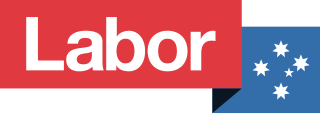
The Australian Labor Party (ALP), also simply known as Labor, is the major centre-left political party in Australia and one of two major parties in Australian politics, along with the centre-right Liberal Party of Australia. The party has been in government since being elected at the 2022 federal election, and with political branches in each state and territory, they currently form government in New South Wales, Queensland, South Australia, Victoria, Western Australia, the Australian Capital Territory, and the Northern Territory. As of 2023, Tasmania is the only state or territory where Labor forms the opposition. It is the oldest continuous political party in Australian history, being established on 8 May 1901 at Parliament House, Melbourne, the meeting place of the first federal Parliament.

Robert James Lee Hawke was an Australian politician and trade unionist who served as the 23rd prime minister of Australia from 1983 to 1991. He held office as the leader of the Australian Labor Party (ALP), having previously served as the president of the Australian Council of Trade Unions from 1969 to 1980 and president of the Labor Party national executive from 1973 to 1978.
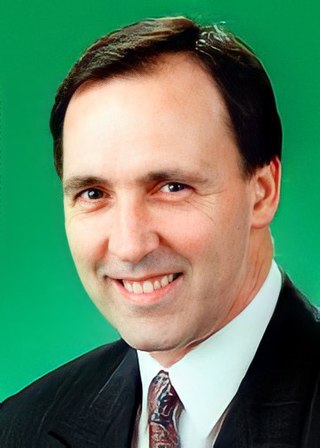
Paul John Keating is an Australian former politician who served as the 24th prime minister of Australia, from 1991 to 1996, holding office as the leader of the Australian Labor Party (ALP). He previously served as the treasurer of Australia in the Hawke government from 1983 to 1991 and as the 7th deputy prime minister of Australia from 1990 to 1991.

Simon Findlay Crean was an Australian politician and trade unionist. He was the leader of the Australian Labor Party (ALP) and leader of the opposition from 2001 to 2003. He represented the seat of Hotham in the House of Representatives from 1990 to 2013 and was a cabinet minister in the Hawke, Keating, Rudd and Gillard governments.

Alexander John Gosse Downer is an Australian former politician and diplomat who was leader of the Liberal Party from 1994 to 1995, Minister for Foreign Affairs from 1996 to 2007, and High Commissioner to the United Kingdom from 2014 to 2018.
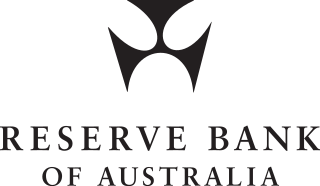
The Reserve Bank of Australia (RBA) is Australia's central bank and banknote issuing authority. It has had this role since 14 January 1960, when the Reserve Bank Act 1959 removed the central banking functions from the Commonwealth Bank.
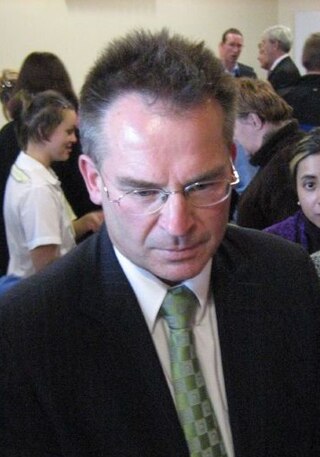
Jonathan Donald Stanhope is a former Australian politician who was Labor Chief Minister of the Australian Capital Territory from 2001 to 2011. Stanhope represented the Ginninderra electorate in the ACT Legislative Assembly from 1998 until 2011. He is the only ACT Chief Minister to have governed with a majority in the ACT Assembly. From 2012 to 2014 Stanhope was Administrator of the Australian Indian Ocean Territories, which consists of Christmas Island and Cocos (Keeling) Islands.

Martin John Ferguson is an Australian former Labor Party politician who was the Member of the House of Representatives for Batman from 1996 to 2013. He served as Minister for Resources and Energy and Minister for Tourism in the Rudd and Gillard governments from 2007 to 2013.

Herbert Cole "Nugget" Coombs was an Australian economist and public servant. He is best known for having been the first Governor of the Reserve Bank of Australia, in which capacity he served from 1960 to 1968.
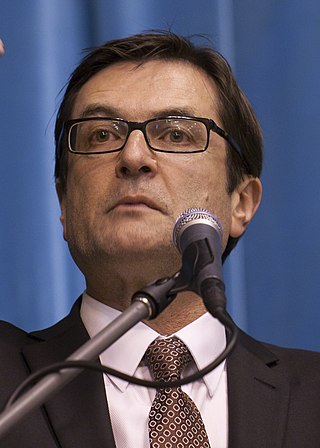
Gregory Ivan Combet is an Australian former politician and trade unionist. He was Secretary of the Australian Council of Trade Unions between 1999 and 2007. He was elected member for the New South Wales Federal seat of Charlton for the Australian Labor Party at the 2007 election and was immediately appointed Parliamentary Secretary for Defence Procurement in the First Rudd Ministry on 3 December 2007. Combet was the Minister for Climate Change, Industry and Innovation in the Second Gillard Ministry before announcing his resignation from the ministry on 26 June 2013 following Julia Gillard's defeat in a leadership ballot. He previously served as Parliamentary Secretary for Climate Change, when Penny Wong was the Minister.
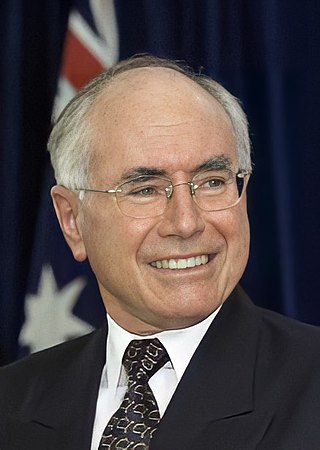
John Winston Howard is an Australian former politician who served as the 25th prime minister of Australia from 1996 to 2007. He held office as leader of the Liberal Party of Australia, having previously served as the treasurer of Australia from 1977 to 1983 under Prime Minister Malcolm Fraser. His eleven-year tenure as prime minister is the second-longest in Australian history, behind only Sir Robert Menzies. Howard has also been the oldest living Australian former prime minister since the death of Bob Hawke in May 2019.
Michael Bernard Easson AM, is an Australian businessman and former trade union leader. On 8 June 1998 Easson was appointed as a Member of the Order of Australia (AM).
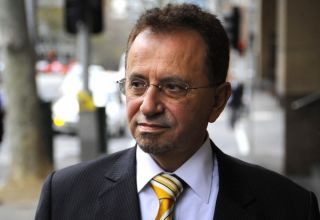
Theo Charles Theophanous is a former Australian politician. He entered politics in 1988 as a member of the Victorian Legislative Council. Theophanous served from 1988 to 2006 as one of the two members for Jika Jika Province, before the reforms to the Victorian Legislative Council that introduced proportional representation. He served as a Minister in the Kirner Government and as the leader of the opposition in the Legislative Council from 1993 until 1999. From 2006 until 2010 he represented the Northern Metropolitan Region and served as Minister in the Bracks and Brumby Governments.

Kenneth Ross Henry is an Australian economist and public servant who served as the Secretary of the Department of the Treasury from 2001 to 2011.

The Howard government refers to the federal executive government of Australia led by Prime Minister John Howard between 11 March 1996 and 3 December 2007. It was made up of members of the Liberal–National Coalition, which won a majority of seats in the House of Representatives at four successive elections. The Howard government commenced following victory over the Keating government at the 1996 federal election. It concluded with its defeat at the 2007 federal election by the Australian Labor Party, whose leader Kevin Rudd then formed the first Rudd government. It was the second-longest government under a single prime minister, with the longest having been the second Menzies government (1949–1966).

The Hawke–Keating government is an all-encompassing term to describe the duration of the Hawke government and the Keating government, which together spanned from 11 March 1983 to 11 March 1996. Both governments were formed by the Australian Labor Party, and were led from 1983 to 1991 by Bob Hawke as Prime Minister, and from 1991 to 1996 by Paul Keating as Prime Minister, with Keating serving as Treasurer throughout the Hawke government. During the Hawke–Keating government, the Labor Party won five successive federal elections, its most electorally successful period to date; the 13-year uninterrupted period of government also remains the Labor Party's longest spell in power at the federal level.

The Keating government was the federal executive government of Australia led by Prime Minister Paul Keating of the Australian Labor Party from 1991 to 1996. The government followed on from the Hawke government after Paul Keating replaced Bob Hawke as Labor leader in an internal party leadership challenge in 1991. Together, these two governments are often collectively described as the Hawke-Keating government. The Keating government was defeated in the 1996 federal election and was succeeded by the John Howard's Coalition government.

The 1996 Parliament House riot involved a physical attack on Parliament House, Canberra, Australia, on 19 August 1996. The riot followed the "Cavalcade to Canberra" protest rally organised by the Australian Council of Trade Unions (ACTU) against the Howard government's first Budget following the 1996 Australian federal election. The demonstrators injured 90 people while forcing their way into the Parliamentary foyer, looting the Parliamentary shop, attacking police and inflicting other damage on the building.
The early 1990s recession saw a period of economic downturn affect much of the world in the late 1980s and early 1990s. The economy of Australia suffered its worst recession since the Great Depression.
The history of the Australian Labor Party has its origins in the Labour parties founded in the 1890s in the Australian colonies prior to federation. Labor tradition ascribes the founding of Queensland Labour to a meeting of striking pastoral workers under a ghost gum tree in Barcaldine, Queensland in 1891. The Balmain, New South Wales branch of the party claims to be the oldest in Australia. Labour as a parliamentary party dates from 1891 in New South Wales and South Australia, 1893 in Queensland, and later in the other colonies.
References
- ↑ Martin, Ross: Bill Kelty interviewed by Ross Martin (sound recording), National Library of Australia, 9 October 2001.
- ↑ "Past & Present Reserve Bank Board Members | RBA".
- ↑ Coorey, Phillip (10 June 2008). "High honours for Howard and his right-hand man". Sydney Morning Herald.